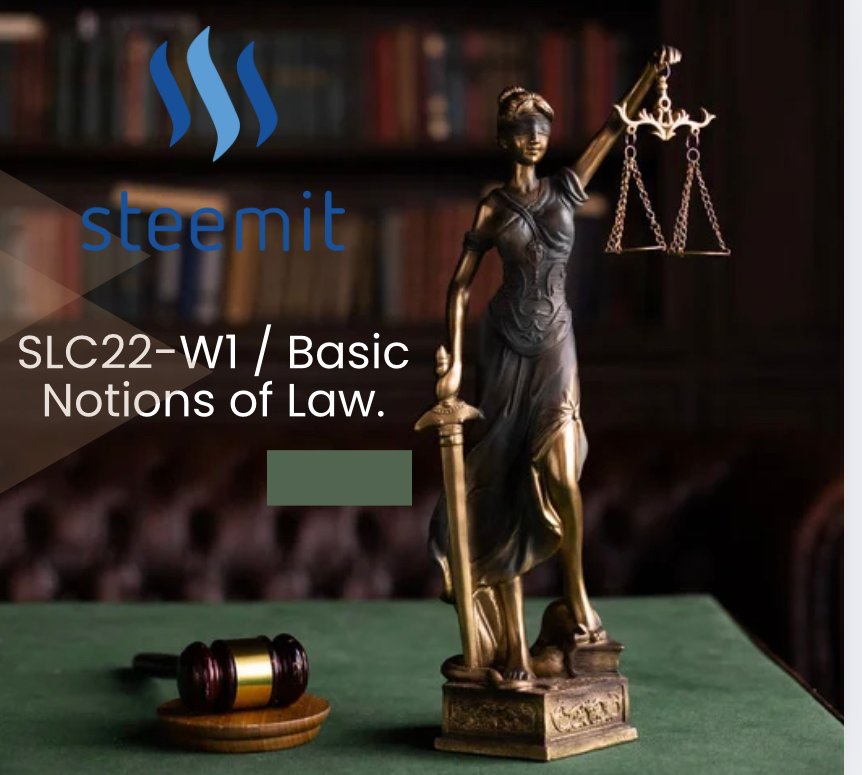SLC22-W1 / Basic Notions of Law.
0 comments
Compliments of the season to all fellow legal minds on the steemit ecosystem and welcome to my blog as I share ideas regarding basic notions of law learning challenge.

| State in your own words and based on what you explained in class: What is law? |
|---|
Law entails rules put in place to govern human actions and behaviours within a given society. It is a way of getting justice to the unjust actions and behaviours of human beings towards each other. It can be in the form of ordinances, decrees, orders, regulations, etc. The law kind of protects our rights and as well regulate our behaviours. Take for instance in Cameroon, the law protects your rights to freedom of speech but at the same time regulates your speech to the extent that hate speech is considered a crime and punishable by law.
| Consider the explanations given in class, according to the law and the laws of your country. I pointed out two examples of "Objective Law" and two examples of "Subjective Law". |
|---|
Cameroon laws are complex and at times, its complexity brings a lot of confusion within the civil system. We have common law, customary law and the civil law due to our colonial heritage. At times a crime punishable in the common law system is not considered a punishment in the civil or the customary law.
Notwithstanding, objective law can be defined as the set of rules established by the state to govern the society irrespective of sex, age, ethnic group, religion. An example of objective law in Cameroon is the penal code. The penal code is a set of rules established by the state with specific crimes and their punishments based on different jurisdictions.

Section 342.
(1) Whoever subjects a person to debt bondage shall be punished with imprisonment for from 5 (five) to 10 (ten) years and with fine of from CFAF 10 000 (ten thousand) to CFAF 500 000 (five hundred thousand).
The second example of objective law is the electoral code which is rules set by the state to govern elections in Cameroon. Section 92(1&2) of the electoral code prohibits the circulation of of electoral materials like the ballot papers, circulars and offenders shall be persecuted.
Subjective law can be defined as those laws protecting the rights of members of the society. They give privileges for individuals to enjoy while abiding to the rules that govern the state. In Cameroon we have the Cameroon constitution whereby the preamble of the constitution declares rights that citizens can enjoy. For instance the preamble states that “…every person shall have the right to settle in any place and to move about freely, subject to the statutory provisions concerning public law and order, security and tranquillity”.
The preamble of the constitution does not compel citizens to be obliged to the law but rather enjoy it as privileges.
Another example as enshrined in the preamble is the right to move freely and settled in any place of your choice. Article 4 of the preamble states “Every person shall have the right to settle in any place and to move about freely, subject to the statutory provisions concerning public law and order, security and tranquillity”.
Practical case:
A citizen is driving a vehicle on the road and passes without respecting the traffic light, seconds later he is stopped by a traffic policeman and this citizen claims that he did not respect the traffic light because he was in a hurry to pick up his son and take him to the hospital because he is sick.
| State according to what you learned, in which part of the case Objective Law and Subjective Law are present. |
|---|
Taking an analysis of the the case putting in mind the CEMAC high way code used in Cameroon which is objective law, the driver violated the traffic lights rules. He was not carrying the patient in the car and the time he was wasting to explain to the traffic police why he violated the law was the same time he would have respected the rules. The high way code stipulates that everyone should respect traffic lights and there was no exception in order to avoid unnecessary accidents.
In terms of subjective law, I will say the driver acted based on his personal interest and did not respect the the law. He acted on his will and the patient was not even present in the car.
| Based on what was explained in class, make a comparison and according to the law of your country. Give an example of a law and an example of a norm. |
|---|
Law are legal mandatory rules set up by the state to govern human behavior within the society. Everyone is obliged to respect the law.
While norms are simple rules set to govern human conduct and unlike law, norms are not mandatory for citizens to respect.
An example of law in Cameroon is the OHADA law which is a law governing businesses in Cameroon. Though it is an international law with Cameroon being a signatory and has ratified this law, meaning once ratified it takes precedence over national laws.
An example of a norm is contract agreement created by a landlord for his tenants. Take for instance stating latest time for the gate to be closed, and open. Another good example of a norm is the council regulations behaviours around public spaces like no drinking of alcohol in public spaces.
For the practical exercise:
Mr. Juan Perez rents an apartment but his financial situation worsens and he has not paid for 3 months. On one occasion, a meeting of apartment owners was held and the owner of the apartment where Mr. Juan Perez lives presents the case to the owners of the other apartments. They take advantage of the opportunity to say that they have received complaints from the neighbors of the building because Mr. Juan Perez has 4 dogs as pets in his apartment, something that is prohibited in the building's rules of coexistence.
| Analyze and explain in which part of the case Mr. Juan Perez is violating a law and in which he is violating a norm. |
|---|
According to Cameroon law, Mr Perez violated the contract law binding the agreement between the tenant and the landlord. This action is punishable following the penal code. The penal code stipulates as an obligatory for tenants to pay their rents. Failure to meet up with the rents will give the landlord an opportunity to arrest Mr Perez, laid down his or her claims and serve Mr Perez a quit notice of his property. He will pay a penalty fee and still have pay for the three months unpaid rents with arrears.
With respect to violating a norm, Mr Perez violated the norm of “no keeping of pets”. The cohabitation rules set by the landlord was not respected.
| Explain in your own words what importance Comparative Law has for you according to what you have seen in class. |
|---|
We live in a global village and I think that comparative law is vital for every society willing to foster growth and development. By using comparative law, we will be able to analyse, reform and construct good laws to govern and put the society in a better position.
For instance, in the past Gender Based Violence was not seen as offensive in Cameroon because traditional values were considered more important. The traditional values subjected women and even men to an extent to some deforming state. Reforming laws to protect victims of GBV is good for Cameroon government to revisit other laws across different countries, analyse them, and bring out those laws that gives everyone equal rights and opportunities irrespective of your gender.
I am inviting @rafk, @m-fdo and @waterjoe to participate in the learning challenge.
Comments